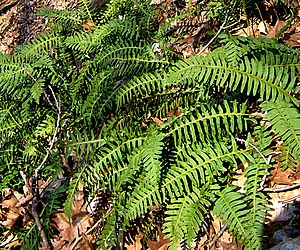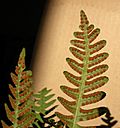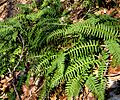Rock polypody facts for kids
Quick facts for kids Rock polypody |
|
|---|---|
 |
|
| Conservation status | |
| Scientific classification |
|
| Kingdom: | Plantae |
| Clade: | Tracheophytes |
| Class: | Polypodiopsida |
| Order: | Polypodiales |
| Suborder: | Polypodiineae |
| Family: | Polypodiaceae |
| Genus: | Polypodium |
| Species: |
P. virginianum
|
| Binomial name | |
| Polypodium virginianum |
|
| Script error: The function "autoWithCaption" does not exist. | |
| Synonyms | |
|
|
Script error: No such module "Check for conflicting parameters".
The Rock Polypody (scientific name: Polypodium virginianum) is a small, green fern that stays green all year. It grows naturally in the Eastern United States and Canada. You can often find this fern growing on rocks, and sometimes on the roots of trees. It's also known as rock cap fern or common polypody.
Contents
What Does the Rock Polypody Look Like?
The Rock Polypody is a small fern. It has special underground stems called rhizomes that help it spread. Its leaves are narrow and can be anywhere from 8 to 40 centimeters (about 3 to 16 inches) long. They are about 3 to 6 centimeters (about 1 to 2.5 inches) wide. These leaves grow on smooth stems called petioles, which are 3 to 15 centimeters (about 1 to 6 inches) long. The leaves stay green all year and have a pointed tip. They are also deeply divided, almost like feathers.
In late summer and fall, you can see large, round spots on the underside of the fern's fertile leaves. These spots are called sori. Inside the sori are tiny cases called sporangia, which hold the fern's spores. These sporangia are mixed with long, brown, sticky hairs.
Where Does the Rock Polypody Grow?
The Rock Polypody fern usually grows on large rocks, cliffs, and rocky slopes. It doesn't need a lot of soil to grow well. This fern is very common across eastern North America. You can find it from Newfoundland in Canada all the way to Yukon. In the United States, it grows south to states like Georgia, Alabama, and Arkansas.
How Scientists Classify This Fern
The scientific name for this fern is Polypodium virginianum. Sometimes, scientists have used other names for it, like P. vinlandicum or different types of P. vulgare. Most scientists today agree that Polypodium virginianum is its own unique species. However, some think it could also be seen as a North American type of the Polypodium vulgare fern, which grows around the northern parts of the world.
This fern is special because it's an allotetraploid. This means it formed from two different parent ferns, Polypodium appalachianum and P. sibiricum, that combined their genes.
Images for kids
 | Sharif Bey |
 | Hale Woodruff |
 | Richmond Barthé |
 | Purvis Young |





